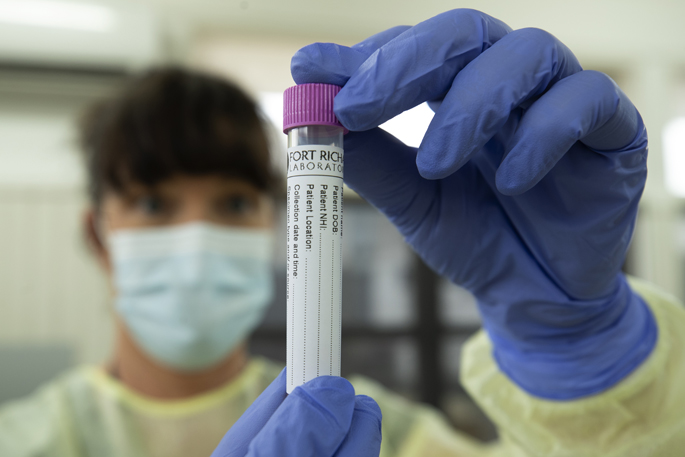Rapid antigen testing will be rolled out wider to Auckland hospitals within days, after a review of the testing strategy said the government was slow to introduce it and saliva tests.
Covid-19 Response Minister Chris Hipkins, Director of Public Health Dr Caroline McElnay, Associate Minister of Health Dr Ayesha Verrall and Professor David Murdoch from the University of Otago have been covering rapid antigen, saliva, and surveillance testing at today's media briefing.
The fast-result tests will also be used in the government's at-home isolation trials for returning travellers in Auckland and Christchurch.
The government had its Covid-19 testing reviewed by the Ministry of Health's Covid-19 Testing Technical Advisory Group, which conducted interviews in late September, and has released the report today.
It says while the performance of the laboratory sector had been very good, Covid-19 testing needed to be more adaptable and the introduction of saliva and rapid antigen testing had been relatively slow.
The group urged the government to set up a dedicated approach for innovation and implementation of new testing technology and strategy to improve their uptake.
"Common themes from the review included the need for better future planning; reduction in silos; a scenario-based testing strategy to help laboratories with planning; a clearer process for accreditation and adoption of new tests; and the urgent need for connection with innovators in the community in order to co-design and implement the testing strategy."
It also called for:
- Additional testing leadership roles
- Testing modelling based on various scenarios
- An assessment of laboratory resilience
- A focus on retaining lab staff
- Facilitation of piloting new testing approaches
- Ongoing external reviews of overseas testing systems
- Public communications strategy
- More technological solutions like e-swab orders, apps and databases for testing and reporting processes
Associate Minister of Health Dr Ayesha Verrall says rapid antigen testing, which has already been introduced at Middlemore Hospital, would be rolled out within days to "high-risk" Auckland City and North Shore hospitals, and would be used in the pilot self-isolation scheme.
"While this technology provides a result quickly, rapid antigen testing tends to be less sensitive at detecting cases - especially in asymptomatic people, or those who are either very early in or towards the end of their infectious period," she says.
"That's why we must ensure a robust system is in place so we don't miss cases. Any people who test positive will be verified with further testing, and managed appropriately - including being linked with healthcare."
She says work was under way at the Ministry of Health to consider how rapid antigen testing could be used.
She says the government is also "working closely with the private sector on a plan to bring rapid antigen tests into the country so businesses can use it in a way that will work best in New Zealand's Covid-19 environment".
Dr Verrall plans to meet with a group tomorrow including business leaders, politicians and officials tomorrow about this.
Prof Murdoch says the testing technical advisory group was formed only a month ago, and has focused on the rapid review of processes and how new tests and innovations are assessed and provided.
"The main purpose of our review was to ensure that Covid-19 testing was agile and fit for New Zealand's Covid-19 response."
He says although PCR will continue to be the main testing option that will be used, more options need to be looked at, including new innovations. Rapid movement in technological developments on testing has taken place since the Covid-19 pandemic began, and great advancements are hoped for in the sector - including on other diseases - he says.



0 comments
Leave a Comment
You must be logged in to make a comment.